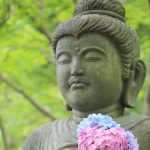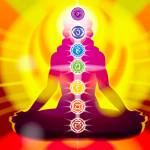There is a myth about meditation. A lot of people think that it is something you can do well or do poorly.
I often work with people who are brand new to meditation. Sometimes they say they have “tried it but haven’t done it right” or feel that they “can’t do it.”
But here’s the thing. Meditation is a practice. Even for the seasoned practitioner, there are times when it is challenging to sit and be still with whatever arises.
The key is that there is an underlying dedication to the practice. That and an insistence to return to it time and again…especially when it’s difficult.
But it even goes beyond the dedication to return to our practice. We want to return to a baseline, to the present moment, while we are practicing.
You Can’t Stop Your Thoughts
Because we are all irrevocably human, our mind will continue to generate thought. For a host of reasons, we are conditioned to engage in conversation with our minds.
It’s commonplace as we move about our days to have a running internal dialogue.
So it’s silly to think that when we pause to meditate that our minds will suddenly stop, and our pattern of engaging with our thoughts will automagically cease.
So what’s a meditator to do?
Don’t Take The Bait
Our aim in meditation is to acknowledge the presence of thought without returning the volley. “Oh, thought is present now. Oh, okay.”
However, it’s folly to think that is either easy or that if you do find yourself talking back to your mind that you are meditating “wrong.”
Instead, you practice noticing that you’re caught in that sticky web of thought, and then you choose to let go of the conversation and return your awareness to the present moment.
This is a powerful teaching, not only for relating to and controlling our awareness, but for life.
Meditation Is Training For Life
I eat well and I exercise regularly. I’m proud of this. But that does’t mean I eat well everyday. It does’t mean I exercise everyday. In fact, there may be a span of a few weeks where I’m not taking optimal care of my body.
The overarching process is one where I recognize when I’m off-center, let go of the behaviors I’m clinging to, and then return home to that place of health and awareness.
This is the broader theme that meditation practice feeds.
We are imperfect. We are humans. When I’m meditating and I realize I’m off indulging in thought about what I have to do later, or what last night’s dream was about, or how my dog needs a bath, I could beat myself up for thinking (“That’s not what I’m supposed to be doing right now!”).
I’m familiar with that path—the unhealthy negative spiral of self-chastising for not meditating “properly.”
Likewise, when I realize that I haven’t been eating well lately, and I’m feeling the effects from it, I could scold myself for not being a perfect beacon of health.
But that solves nothing. Shaming myself hasn’t ever changed my behavior. It just makes me feel bad.
So instead, just as I let go of thoughts in meditation, I can let go of my poor diet and exercise patterns with ease. And by doing so, I free myself to return back home, back to the place of health.
The Benefits Of Practice
Over time, I’m less likely to get swept away by background noise in meditation. Sure, I still get hooked into thought, but it’s not as frequent.
More importantly, I’m quicker to notice that I’ve strayed from my center, away from the space of just being.
Likewise, over time, it takes me less to recognize I am off in a not super healthy space of food and exercise, so I don’t stray as far.
I don’t expect every meal I eat for the rest of my life to be one of the perfect mix of fruits and locally-grown vegetables, whole grains, organic, grass-fed wild-caught meats, without ever imbibing a hint of sugar, caffeine, or alcohol.
I do expect that the more I set my anchor in the place of health, the more quickly and easily I will recognize when I have strayed from that, and be able to come back to that mooring.
This is true for any pattern of behavior. For some, it will be working hard. For others, it will be putting energy into their relationship, or shopping and spending money, or setting healthy boundaries with family members.
Meditation Means Coming Home
We all are human. We each have our challenges.
The practice of meditation gives us the tools to establish ourselves in the present moment and to notice all sensation without judgment, so that we may return to that place time and again when we notice we have strayed.
We’re free to apply this to our lives in a multitude of ways.
With meditation practice, we ground in a place of physical health, or financial balance, or personal boundary, and then we notice when we have strayed, and then we come gently back to that solid silent homeground.




Nice and informative article..thanks
Thank you!
Very helpful. I dealt with this at my morning meditation.
Helpful to hear that this is common.
Thanks.
Thanks for sharing.
It is a common occurrence, and I’ve heard so many people get discouraged by it that I wanted to alleviate the defeated attitude. Just keep going back!
Great points, well made – thanks!
Thank you Justin!
Thank you this reminder was just what I needed at this very moment. Much love and many blessings.
Perfect. I’m so glad! Thank you for commenting.
Thank you for reminding me to not beat myself up for not meditating or excersising for a while, for having a break, I’m looking forward to getting back to it in the new year! Without guilt and without blame!
Yes! I often call it “permission to be human.” So often I find for myself and others that we hold ourselves to such incredible standards. While it’s good to have high standards and to push ourselves, we need to give us some kindness when we don’t live up to exactly what we want. We’re all doing the best we can. 🙂
Happy new year!
Very nicely explained.
Its important for each of us to understand that even if we do become “aware” that we have strayed from our center is good enough to bring us back whenever possible to the closest-to-ideal state, atleast for the beginning of our journey.
Most times people tell me that I couldn’t meditate because there were too many thoughts.
This is a good explanation you have given for that. 🙂
Yes! Thank you!
The greatest part is that the action of being aware that we have strayed *is* being in the present. We are unhooked from the thoughts we were tangled up with in that moment and are suddenly freed to rest our awareness wherever we’d like. That’s where the persistence and commitment kick in.
This article is on point! We are all human…
Consistency and practice are the key!
Namste
Hi Adem – Thank you for commenting. Yes! Taking the long view we move towards a space of greater awareness and health. No mountain climb is perfectly straight.
Hi David E. , may l ask u what is a human ? U seem to hv two entities , the meditation state ( ” no thought ” ) , & the human state. When l think of Human l think of Ego ( human thoughts & human emotions ). Is it as simple as that ? Is that how u define Human ? How do u define: Human ?
Thank u , Tim Garrison
Hi Tim –
Thank you for your comment and questions! When I say we are human it is to provide us room for error. We so often hold ourselves to such high standards which no innately imperfect and fallible being could obtain. That’s how I’m using it here.
Yes, we can certainly consider ourselves to be Consciousness manifesting in a human form, and are a combination of both pure, non-dual Awareness as well as the human Ego. Using that perspective, I would consider the “human” part to be our Ego.
Does that help?
-Dave